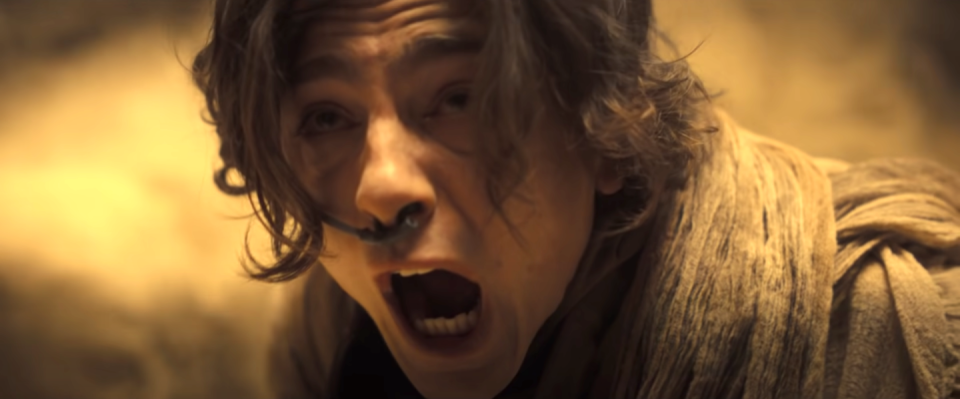What the Ending of ‘Dune’ Means for the Next Movie

Denis Villeneuve’s Dune ends with a prophesy becoming realized: Paul Atreides (Timothée Chalamet), a prince from the planet Caladan where he saw visions of the Arrakis’ Freman—and, in particular Chani (Zendaya), leading him through caves and sands—follows a procession of Fremen over the ridge of a dune, Chani leading him, his mother behind.
The sequence occurs just over halfway through Frank Herbert’s novel, upon which Villeneuve’s film takes the majority of its narrative queues; the movie is faithful. At this point in both stories, Paul has fled the Atreides stronghold in Arrakeen after betrayal by its former inhabitants and enemy to the Atreides family, the Harkonnen. The flight from the capital leads Paul and his mother, Lady Jessica (Rebecca Ferguson), into the desert, where they meet the Fremen. The meeting turns violent when one of the Fremen, Jamis, convinced that Lady Jessica has used witchcraft to disarm Stilgar (Javier Bardem), evokes the Amtal Rule, challenging Lady Jessica to fight to the death.
Paul choses to fight in his mother’s place and kills Jamis. The act ingratiates Paul with the Fremen. While Lady Jessica insists the pair eventually leave Arrakis, Paul, his visions becoming more intense due to both exposure to the spice and his Bene Gesserit training, declares that he will not run; he will not leave his father’s resting place and cede power.
The fight completes Paul’s rite of passage, which began on Caladan when the Bene Gesserit Revered Mother first tested his powers. Paul’s acceptance into the Fremen order represents a mythological “dual kingship,” where the hero begins to move between worlds—the familiar one from earlier in the story and the new extraordinary world.
Of course, the ending to Dune has even more consequences for the characters and the story—and portends a dark twist on the traditional heroic myths. Without spoiling Dune 2, which will draw from the second half of Herbert’s first novel, here’s the Dune ending explained.

What does the Dune ending mean?
When Paul and his mother meet the Fremen there are whispers, doubts. Is Paul the one they’ve learned about, the messiah? Paul’s arrival on Arrakis is met with hordes of locals pointing at him, wondering. (His mother, too, is subject to these beliefs when a house maid explains that both she and Paul were foretold.) When Paul asks his mother, she explains that the Bene Gesserit has already laid the groundwork for the Atreides’ arrival, planting the seed of a religious belief: Paul, the son of a Bene Gesserit, will be, for them, some kind of savior. Paul scoffs at the manipulation.
But there’s also indication that Paul believes the hype. Toward the end of the film, one can see a growing rift between Paul and his mother, who is no longer able to control her son or guide him as she could previously. As in the novel, their dynamic shifts in the desert, with Paul becoming more commanding and authoritative after the death of King Leto. Perhaps he really was meant to rule.
His visions are enhanced by the presence of spice in the desert air, and he foresees himself on the battlefield fighting alongside the Fremen, beneath a black flag. Though the film does not use this language, the novel foretells of religious “jihad”; Paul’s visions are of himself as leader and military commander of this struggle. Of course, we are made to understand that it is a false religion based on lies told by the Bene Gesserit to the people of Arrakis. That fact, however, becomes less and less important; the messiah becomes real.
Paul’s passage into the Fremen’s world suggests a false prophesy slowly becoming reality—as well as a hero becoming increasingly convinced of his power (however ordained it may be). The Fremen’s growing fervor, the rift between mother and son, the visions of union with Chani; these features make room for a violent and unconventional second part to this desert myth.
You Might Also Like

